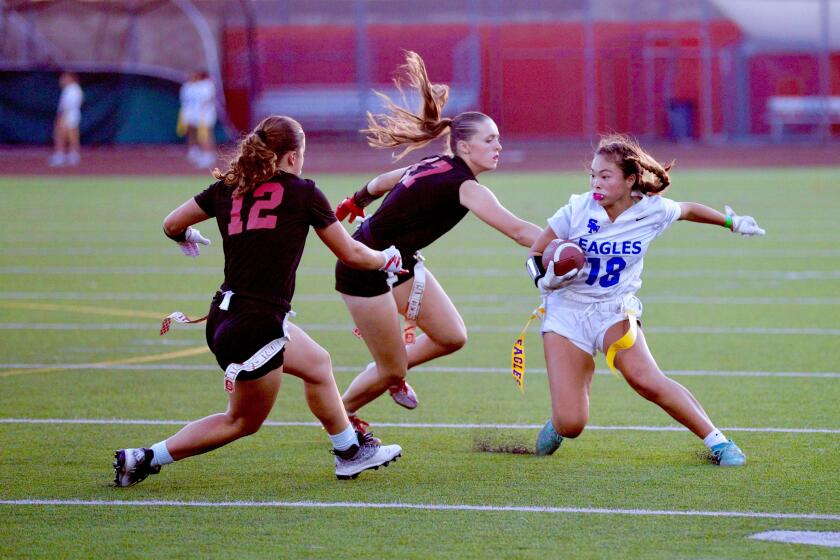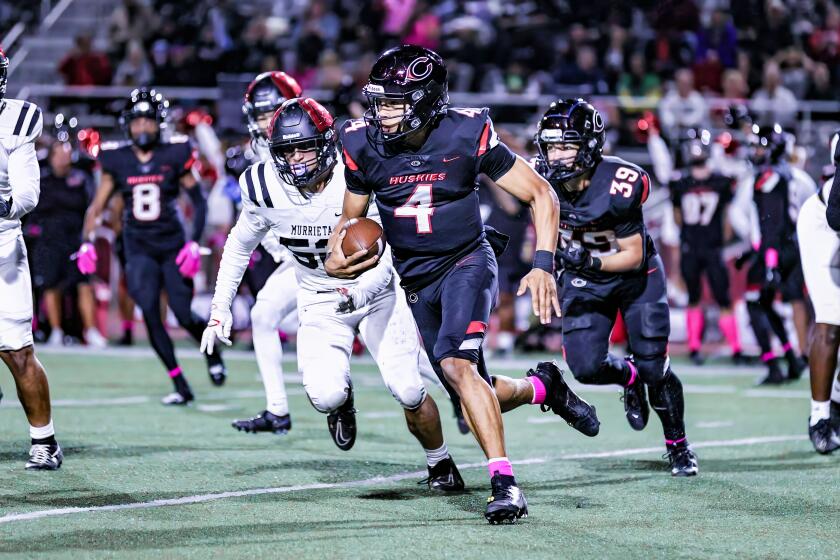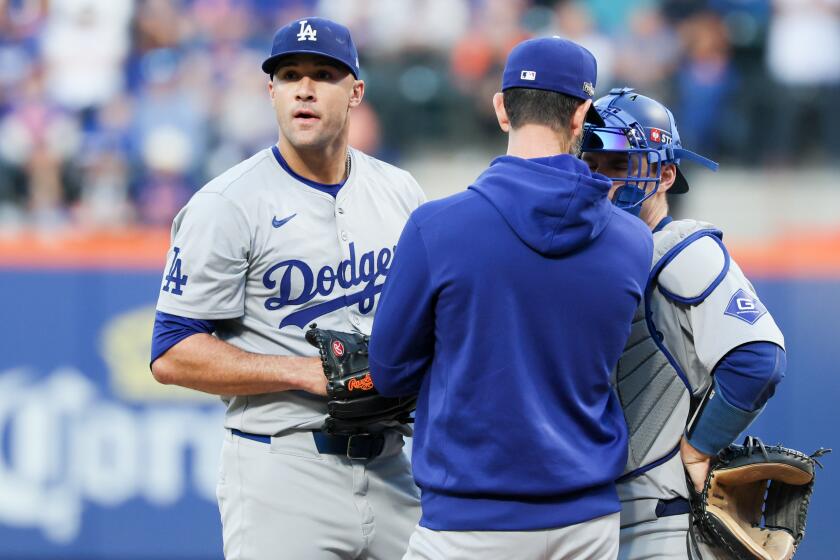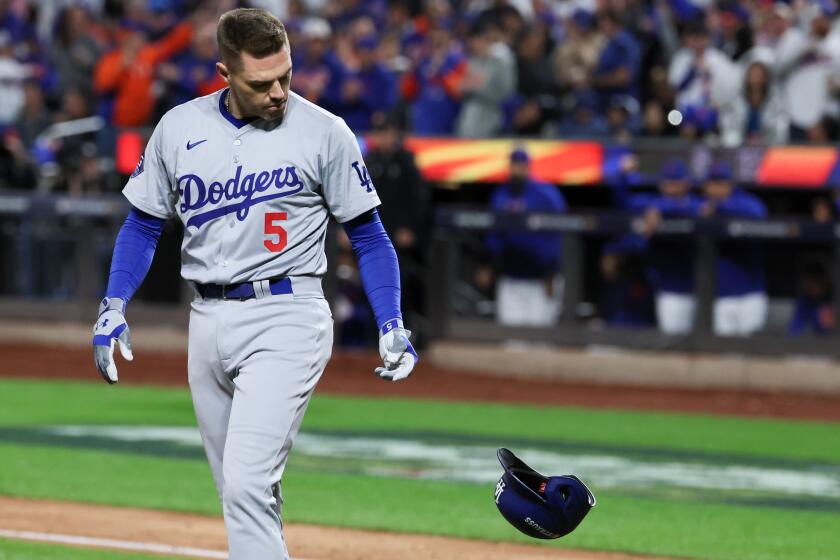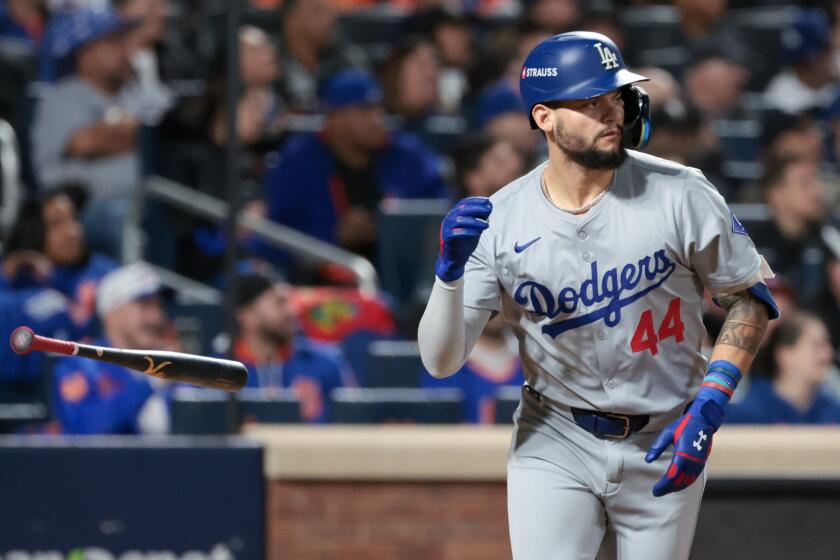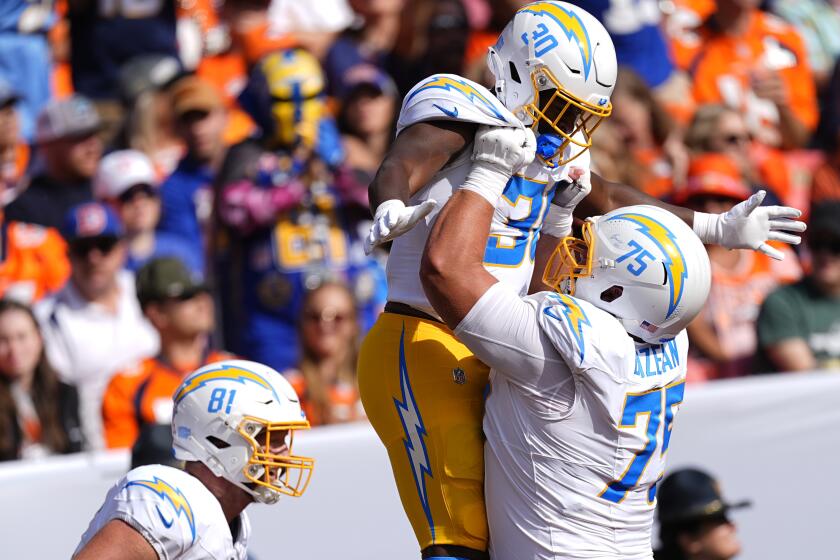Martinez Pitches for Montreal, and All of Nicaragua
For the pitcher with a country on his shoulders, today will be the same as every other day on the road. He will labor beneath the weight.
When Montreal’s Dennis Martinez wakes up in his Los Angeles hotel, where he is staying with the Expos for their three-game weekend series against the Dodgers, he will notice the little things. The room will be cool. The sheet will feel fresh. The towels will fluff.
But then the phone will ring. The voice on the other end will be speaking Spanish. The voice will call him El Presidente.
“It will be a local person from Nicaragua,” said the most popular athlete and role model of that Central American nation. “Maybe I know him, maybe not.
“He will talk about pitching first. Then he’ll talk about my country. About the problems, the poverty, the children. He will bring up this picture I have in my mind of how bad it has become.”
Martinez won’t ask if the voice is a Sandinista or a Contra, for he claims he is neither. He will ask again about the children.
The voice will inevitably wonder if Martinez is free for lunch at the kind of modest restaurant most ballplayers wouldn’t even walk through. Martinez would accept, except he knows what is coming after he hangs up the phone.
“It will ring again, and again, and again,” he said. “More families from Nicaragua. More of my people. I can’t have lunch with everybody.”
If he can fit it around an Alcoholics Anonymous meeting--he hasn’t had a drink in nearly six years--he will inevitably give in and meet some people. If they sound poor, he will dress casually, so as not to intimidate. After a couple of hours of talking about his homeland, he may leave with hurting heart and thinner wallet.
Around mid-afternoon, he will set his mind to baseball and go to the park. But once there, particularly in Los Angeles, sometimes it gets worse.
“In Los Angeles, I feel like I am Fernando Valenzuela,” he said.
Somebody will be waving a Nicaraguan flag. Many will still be there long after the game is over, waiting outside the clubhouse to greet him.
So many voices, so little time.
“Every day I feel, ‘I am so lucky,’ ” he said. “But I am also so sad.”
Teammates and opponents experience another feeling--amazement, for despite this self-imposed burden, Dennis Martinez is having the best season of his life.
After his complete-game victory in San Diego Wednesday, Martinez is 15-4 with a 2.92 earned-run average, 123 strikeouts and just 42 walks. Earlier this season he won 11 straight games, an Expo record and the longest winning streak by any pitcher in five years.
“All of this stuff he must go through, he has conquered all of it, and just look at him,” Expo Manager Buck Rodgers said. “He’s stronger than ever.”
Any story written about Dennis Martinez a couple of years ago might not have mentioned Nicaragua. The former Baltimore Oriole star had too many problems in his new country.
Shortly after a sullen, moody Martinez was part of the Orioles’ World Series championship in 1983, he drove his world apart. It was Dec. 23, 1983, not coincidentally the day of his last drink.
After partying his way through a Monday night football game at a local health club, he was trying to drive home when his car had a flat tire. Police stopped, smelled his breath, and arrested him.
He spent much of the night in jail, then spent the next several weeks in an alcohol rehabilitation center. That period included Christmas and New Year’s days, occasions that required his family to visit him, which forced him to accept reality.
“I was powerless over liquor,” he says today. “I finally understood--I am an alcoholic.”
Martinez started drinking in his hometown of Granada, Nicaragua, when he was 15. When he came to the United States at 19, he drank to fit in. When he became the first Nicaraguan to make the major leagues at 21, he drank to ease the pressure.
Finally, during a 1983 championship season that should have been the highlight of his career, he customarily set two bottles of wine on ice in his hotel room and spent the entire game thinking about running back to drink them.
“The last weeks, I couldn’t wait to leave the game to get back to that wine,” he said.
Said Dodger catcher Rick Dempsey, formerly Martinez’s Oriole teammate: “We all knew something was wrong. He couldn’t get along with anybody. We got in a few fights. He gave up on himself.”
During his rehabilitation, that changed. Martinez, the son of a heavy drinker, decided that his future could be better than his past. He decided that his life was too good to spend in a haze.
He felt such a rush of good will, he has since decided to spread some of those feelings around.
“I realized how blessed I have been, how wonderful and lucky my life has been,” he said. “I needed to share that.”
The first thing affected was his career. Two years after being traded from Baltimore to the Expos in 1986, he went 15-14 last season with a 2.72 ERA. It was his most impressive season in six years.
At the same time he was getting set with the Expos, he began to seriously worry about home.
“Before, I don’t care about Nicaragua because I don’t even care about myself,” he said. “Now, I realize my responsibility.”
Even when he was drinking, he would return occasionally to Granada, bearing gifts and riding in parades. But last winter in Miami, where he lives, he did more.
Several hundred Nicaraguan refugees there were sent to live in Bobby Maduro Miami Stadium until they could obtain work permits, a situation that attracted national attention because of the stadium’s proximity to the nearby Super Bowl festivities.
“I drove over to see these people and it brought tears to my eyes,” Martinez said. “I saw these people and I knew, this was my job. They were looking at me for help. I had to help.”
He understood that the refugees needed more than just food and clothing. They needed respect.
So he brought them boxes of soap, toothbrushes, deodorant, toilet paper. From 8 p.m. to 2 a.m. one winter night, he made deliveries. Once his hands were empty, he worked from his heart, visiting, talking, encouraging.
“It was a touching, feeling thing,” Martinez said. “I told them how, they had to behave themselves in this country, how they couldn’t do everything their own way. I told them how, if I could do it, they could do it.
“I saw how just being there, I lifted their morale. And they made me feel stronger.”
He eventually returned to his home with the large bedrooms and swimming pool. But the work didn’t stop. He became the manager of a local Nicaraguan sandlot baseball team.
He also began working with the Nicaraguan Task Force Committee to help ease the refugees’ transitions from the war fields to the U.S. workplace.
“He has all these things to think about--then look at his pitching record,” marveled young Expo catcher Nelson Santovenia, also a Miami resident. “That shows you what kind of winner he really is.”
Martinez’ biggest challenge, though, is yet to come. This winter for the first time since 1987, he will return to Nicaragua.
And he will be taking more than Christmas presents. He, his wife and four children will take food and medicine.
“It’s a risk there, I know it,” Martinez said. “There is a lot of bad, jealous people there. People are hungry. People know I have money.
“I will get off the plane and there will be tanks. It is not the same as when I grew up.”
Yet the most important part of Nicaragua is the same.
“It is still my home,” Martinez said. “I go there by God’s will.”
And the Expos’ blessing.
“We won’t try to stop him,” Rodgers said softly. “You got to let a man do what’s in his heart. And that’s definitely in Dennis’ heart.”
Rodgers paused.
“Sure, you worry about it, but what are we going to do?” he said. “I’m sure the (Pittsburgh) Pirates would have liked to have stopped Roberto Clemente making his trip down there too.”
More to Read
Go beyond the scoreboard
Get the latest on L.A.'s teams in the daily Sports Report newsletter.
You may occasionally receive promotional content from the Los Angeles Times.




